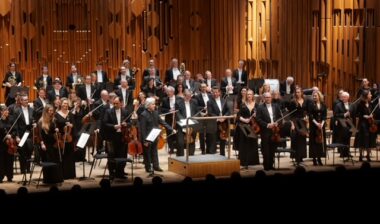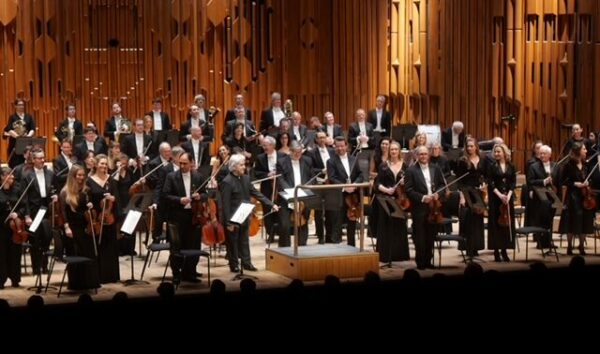 United Kingdom Coleridge-Taylor, Beethoven, Tchaikovsky: Martha Argerich (piano), Oxford Philharmonic Orchestra / Marios Papadopoulos (conductor). Barbican Hall, London, 24.2.2025. (AK)
United Kingdom Coleridge-Taylor, Beethoven, Tchaikovsky: Martha Argerich (piano), Oxford Philharmonic Orchestra / Marios Papadopoulos (conductor). Barbican Hall, London, 24.2.2025. (AK)

Coleridge-Taylor – Ballade in A minor, Op.33
Beethoven – Piano Concerto No.2 in B-flat major, Op.19
Tchaikovsky – Symphony No.4 in F minor, Op.36
In July 2024, I attended Opera Holland Park’s production of Handel’s Acis and Galatea (review here). Being as surprised as impressed by the young conductor in charge, I dedicated two extensive paragraphs to him. Among many thoughts I wrote: ‘Conductor Michael Papadopoulos, probably in charge of all aspects of the musical performance, surprised me. I did not expect such astonishing accomplishment from a young person still at the beginning of what hopefully will be a splendid career’. I did not put into writing but I was wondering where and how this conductor learnt such sensitivity towards music and musicians.
Now I have a pretty good idea where young Papadopoulos might have encountered the art of discipline, musical sensitivity and dedication to music and musician. He is not the first young Papadopoulos to fully immerse himself in music: some fifty and sixty years ago his father Marios was an extraordinary trailblazer.
Marios Papadopoulos, now 70, is an excellent and experienced pianist, conductor, administrator and orchestra builder. He founded the Oxford Philharmonic Orchestra in 1998 and is still leading it. Many (if not all) of the members are established soloists. Unusually, there seems to be some democracy within the orchestra; unlike other orchestras, they do not have any rank-and-file player: the lowest grade in this orchestra is sub-principal, all are appreciated. Judging by this concert, there is unity with conductor Marios Papadopoulos and within the orchestra.
Papadopoulos clearly knows whatever music he conducts and conveys his musical ideas within what seems to be a musical a dialogue with his musicians. No matter what the music is or who the musicians are, Papadopoulos communicates with clarity and sincerity.
This was my first encounter with Coleridge-Taylor’s Ballade in A minor which, in turn, was the composer’s debut piece at age of 23. I enjoyed the beautifully played lovely long tunes as well as the exciting rhythmic passages and I appreciated the OPO’s tribute to the composer.
Maestra Martha Argerich’s delivery of the Beethoven concerto was a marvel to behold. With her large palette of tonal colours and dynamics, she is an orchestra by herself. However, she immerses herself into the orchestra around her and, of course, into all what Beethoven composed. The music has Mozartian qualities but also extensive demanding virtuoso passages which felt like child’s play in Argerich’s hands. She never plays repeated (or similar) passages the same way twice and her sense of musical humour is pure joy. I do not know whose cadenza Argerich played at the end of the first movement – there is no cadenza in my Boosey & Hawkes mini score – but for sure it was a declamation from Bach to Beethoven, with lyrical as well as virtuoso sections, always with transparent harmonic changes.
As the first movement, the second movement too started with a highly sensitive orchestral introduction, allowing the soloist to join smoothly. Argerich shaped every note with great care but also with beautiful agogics (rubato within the bar); her posture at the piano signalled her total focus. For me, Argerich’s delicate bell-like solo arpeggio passages towards the end of the movement equated with the trumpet announcement of the arrival of Don Fernando (who saves Florestan and restores justice) in Fidelio. This was Argerich announcing the good and noble, and then breaking attacca into the joys of the third movement.
Too many performances far and wide ignore the importance of bar lines and consequent accents but Argerich respects all, with clear tonal differences between major and minor sections. Her intermezzos between the recurring rondeau theme were varied and beautiful, communication and unity between conductor and pianist could have served as a masterclass to many celebrated stars. (Here is a short clip from the performance, released by Argerich.)
Argerich’s encore continued the exemplary collaboration between conductor Papadopoulos and herself. They played the third piece – Laideronnette, Empress of the Pagodas (Laideronnette, Impératrice des Pagodes) – from Ravel’s five-movement Mother Goose (Ma Mère l’Oye) for four hands, composed in 1910. Argerich took the upper part, again giving us pearls of semiquaver passages, while Maestro Papadopoulos provided the rock-solid base to build on. If one did not look, it would have been easy to mistake the four hands for two.

Papadopoulos conducted the Tchaikovsky Fourth Symphony from memory. Right from the opening grand fanfare – and all way through – conductor and the orchestra delivered a magnificent performance with full knowledge of the score, virtuosity, discipline, passion, lyricism, and transparent inner voices. As his son in Holland Park Opera’s Acis and Galatea, Papadopoulos senior produced magical pianissimos, this time with a full symphonic orchestra in a large concert hall. Too often Tchaikovsky symphonies are delivered fast and loud; this time the composition was treated with full respect for the structure and the composer’s intentions.
For me there was one fly in the ointment; nothing to do with the music and the top-quality performances but – or precisely because of it – it proved an irritation for me throughout.
Conductor, soloist and the orchestra treated the event with great respect musically as well as with their all-black attire…except for a young lady on the No.3 first violin seat whose legs were shown at least up to knees but often also above. She may be a wonderful violinist but visually she was out of sync with all other performers on stage…and what wonderful performers they all were…
Agnes Kory
